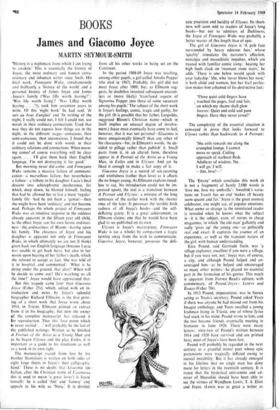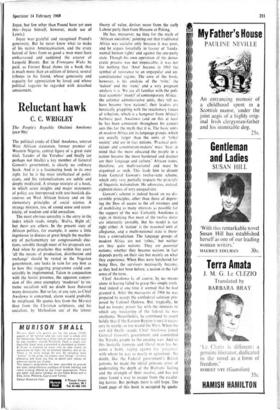James and Giacomo Joyce
BOOKS
MARTIN SEYMOUR-SMITH
`History is a nightmare from which I am trying to awaken.' This is essentially the history of Joyce, the most ordinary and human extra- ordinary and inhuman writer since Swift. His
final work, Finnegans Wake, simultaneously and brilliantly a 'history of the world' and a
personal history of James Joyce and James ...Joyce's family (`Was liffe worth leaving?': 'Was life worth living'? Was Liffey worth leaving . . ./), took him seventeen years to
Write. Of this 'night book' he had said, 'le suis au bout d'anglais' and 'In writing of the
night, I really could not, I felt I could not, use words in their ordinary connections. Used that way they do not express how things are in the night, in the different stages—conscious, then semi-conscious, then unconscious. I found that it could not be done with words in their ordinary relations and connections. When morn- ing comes' of course everything will be clear again. . . . I'll give them back their English language. I'm not destroying it for good.'
But morning never did come, and Finnegans Wake remains a massive failure of communi-
cation—a marvellous failure, but nevertheless a failure—a tribute to his daughter Lucia's final descent into schizophrenic incoherence, for which, deep down, he blamed himself, feeling that had he allowed her to live a more 'regular' family life—had he not been a `genius'—then she might have been 'ordinary' and not become
mad. Perhaps the whole project of Finnegans Wake was an intuitive response to the oddness
already apparent in the fifteen year old child, to the effect Joyce saw his own heroic ordinari- ness—the .ordinariness of Bloom—having upon his family. The closeness of Joyce and his
daughter is apparent not only in Finnegans Wake, in which ultimately we are not (I think)
given back our English language (because Lucia was unable to get back hers), but also in her words upon hearing of her father's death, which she refused to accept as fact. She was told of it in hospital, and commented : 'What is he doing under the ground, that idiot? When will
he decide to come out? He's watching us all the time?' Joyce would have appreciated that. But this tragedy came later than Giacomo Joyce (Faber 25s), which, edited with an in-
troduction and notes by Joyce's splendid biographer Richard Ellmann, is the first print-
ing of a short work that Joyce wrote about 1914, in Trieste. Ellmann printed an extract from it in his biography; but now the owner of the complete manuscript has released it for reproduction. Thus this 'love poem which is never recited . ..' will probably be the last of the published writings. Written as he finished A Portrait of the Artist as a Young Man and as he began Ulysses and the play Exiles, it is important as a guide to his intentions as well as a work in its own right.
The manuscript (saved from loss by his brother Stanislaus) is written on both sides of eight large sheets in Joyce's 'best calligraphic hand.' There is no doubt that Giacomo (in Italian, after the Christian name of Casanova, this is used to mean 'a great lover') is Joyce himself: he is called 'Jim' and 'Jamesy' and appeals to his wife as 'Nora.' It is distinct from all his other works in being set on the Continent.
In the period 1908-09 Joyce was teaching, among other pupils, a girl called Amalia Popper (she died in 1967). Probably this girl did not meet Joyce after 1909; but, as Ellmann sug- gests, he doubtless invented subsequent encoun- ters or (more likely) 'transfused aspects of. Signorina Popper into those of some successor among his pupils.' The subject of the short work is Joyce's feelings, comic, tragic and guilty, for the girl. (It is possible that her father, Leopoldo, suggested Bloom's Christian name—which in itself implies an unusual degree of involve- ment.) Joyce must eventually have come to feel, however, that it was too personal—Giacomo is more unequivocally himself than any other of his characters—for, in Ellmann's words, 'he de- cided to pillage rather than _publish' it. Small parts from it, in an altered form, therefore appear in A Portrait of the Artist as a Young Man, in Exiles and in Ulysses. And yet he liked it enough to make a fair copy of it.
Giacomo Joyce is a record of sex-yearning and wistfulness (rather than love) as it affects the no longer young. As Ellmann explains (need- less to say, his introduction could not be im- proved upon), the text is a transition between A Portrait and Ulysses: a mixture of the long sentences of the earlier work with the shorter ones of the later. It possesses the terrible Irish sadness of all Joyce's books—and the self- deflating gaiety. It is a great achievement, as Ellmann claims; one that he would have been glad to see published on its own.
Ulysses is Joyce's masterpiece; Finnegans Wake is (as a whole) by comparison a tragic turning away from the wish to communicate. Giacomo Joyce, however, possesses the deli- cate precision and lucidity of Ulysses. Its short- ness will seem odd to readers of Joyce's long books—but not to admirers of Dubliners; the Joyce of Finnegans Wake was probably a better master of this length than of epic.
The girl of Giacomo Joyce is 'A pale face surrounded by heavy odorous furs,' whose 'quality' stimulates the narrator's affection, nostalgia and masochistic impulses, which are treated with familiar comic irony : hearing her high heels clack on 'resonant stone stairs,' he adds,- 'There is one below would speak with- your ladyship.' She, who 'never blows her nose,' is both child and woman; but her frail perfec- tion makes him ashamed of his destructive lust : `Those quiet cold fingers have t touched the pages, foul and fair, on which my shame shall glow forever. Quiet and cold and pure fingers. Have they never erred?'
The complexity of the essential situation is conveyed in prose that looks forward to Ulysses rather than backwards to A Portrait:
'She coils towards me along the crumpled lounge. I cannot move or speak. Coiling approach of starborn flesh. Adulterer of wisdom. No. I will go. I will.
—Jim, love!—'
The 'Envoy' which concludes this work (it is not a fragment) of barely 2,000 words is 'love me, love my umbrella': Sweelink's varia- tions on Youth has an end 'makes all beauty seem quaint and far.' Joyce is the great esoteric celebrator, one might say, of popular emotions. What seems so strange to the uninitiated reader is revealed when he knows what the subject is—it is the subject, even, of stories in cheap magazines, in which 'the old man' gallantly and sadly 'gives up' the young one—as pellucidly real and exact. It captures the essence of an experience, as well as the transient nature of the girl, with human understanding.
Ezra Pound, said Gertrude Stein, was 'a village explainer, excellent if you were a village, but if you were not, not.' Joyce was, of course, a city, and although Pound helped and en- couraged him—as he helped and encouraged so many other writers—he played no essential part in the formation of his genius. This much is apparent from Forrest Read's edition, with commentary, of Pound Joyce : Letters and Essays (Faber 70s).
In 1913 Pound, impecunious, was in Sussex acting as Yeats's secretary. Pound asked Yeats if there was anyone he had missed out from his Imagist anthology, and Yeats recalled a young Irishman living in Trieste, one of whose lyrics had stuck in his mind. Pound wrote to him, and the two became friends, eventually meeting in Sirmione in June 1920. There were many letters: sixty-two of Pound's written between 1914 and 1920 have survived and are printed here; most of Joyce's have been lost.
Pound will probably be regarded in the next century as a graceful minor poet whose epic pretensions were tragically inflated owing to mental instability. But it has already emerged in his lifetime that no single man has done more for letters in the twentieth century. It is ironic that the hysterical anti-semite and ad- mirer of Mussolini should have been able to see the virtues of Wyndbam Lewis, T. S. Eliot and Joyce. (Lewis was as great a writer. as Joyce, but few other than Pound have yet seen this—Joyce himself, however, made use of Lewis.) Joyce was•grateful and recognised Pound's generosity. But he never knew what to make of his native Americanisation, and the crazy hatred of Jews from so good a man must have embarrassed and saddened the creator of Leopold Bloom. But in Finnegans Wake he paid, as Forrest Read shows (in a book that is much more than an edition of letters), several tributes to his friend, whose generosity and capacity for appreciation he loved and whose political vagaries he regarded with detached amusement.



































 Previous page
Previous page